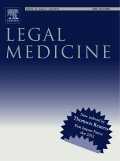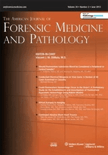
Legal Medicine
Scope & Guideline
Illuminating the path of forensic inquiry.
Introduction
Aims and Scopes
- Forensic Pathology and Autopsy Findings:
The journal frequently publishes articles related to forensic pathology, emphasizing the significance of autopsy findings in determining cause of death, including cases of poisoning, trauma, and natural causes. - Forensic Genetics and DNA Analysis:
Research on genetic markers, including STR loci and SNPs, is a core area of focus, with many papers dedicated to advancements in forensic DNA analysis techniques and their application in personal identification. - Toxicology and Substance Abuse:
The journal addresses toxicological aspects of forensic cases, exploring the implications of drug overdoses, substance abuse, and poisoning, which are critical in legal investigations. - Trauma and Injury Analysis:
Papers discussing various forms of trauma—including ballistic injuries, blunt force trauma, and complex suicides—highlight the journal's commitment to understanding the mechanisms and legal implications of injuries. - Pediatric and Child Forensics:
A significant body of work is dedicated to child-related forensic issues, including child abuse, neglect, and the unique challenges faced in pediatric forensic investigations. - Emerging Forensic Technologies:
The journal embraces advancements in forensic technology, including the use of imaging techniques, machine learning, and bioinformatics, reflecting a modern approach to forensic investigations. - Legal and Ethical Considerations in Forensics:
Articles often explore the legal implications of forensic findings, including ethical dilemmas faced by practitioners and the impact of legal frameworks on forensic practices.
Trending and Emerging
- Impact of COVID-19 on Forensic Investigations:
The pandemic has led to a surge in research exploring the implications of COVID-19 on forensic practices, including autopsy findings and legal considerations surrounding deaths related to the virus. - Machine Learning and AI in Forensics:
There is a growing trend towards the application of machine learning and artificial intelligence in forensic science, particularly in areas such as image analysis for age estimation and crime scene reconstruction. - Complex Suicide Cases and Methodologies:
Emerging themes around complex suicides, including multi-faceted analyses of motivations and methods, indicate a heightened interest in understanding this sensitive area of forensic investigation. - Ethics and Legal Implications of Forensic Practices:
As forensic science continues to evolve, there is an increasing focus on the ethical and legal implications of forensic practices, including discussions surrounding consent, privacy, and the use of forensic evidence in court. - Substance Abuse Trends and Forensic Toxicology:
Research on trends in substance abuse, particularly in relation to new psychoactive substances, is gaining traction, reflecting public health concerns and legal implications. - Pediatric Forensics and Child Abuse Prevention:
A notable increase in studies related to pediatric forensics suggests a growing recognition of the importance of addressing child abuse and neglect within the forensic context.
Declining or Waning
- Traditional Forensic Anthropology:
There has been a noticeable decrease in publications focusing solely on traditional forensic anthropology techniques, as newer methodologies and technologies gain traction in the field. - Manual Techniques in Forensic Identification:
The reliance on manual and less sophisticated methods for forensic identification is waning, with a shift towards more automated and technology-driven approaches. - Forensic Odontology:
While still relevant, the frequency of articles specifically dedicated to forensic odontology has decreased, possibly due to the integration of dental analysis within broader forensic genetics studies. - Historical Case Studies:
There seems to be a decline in the publication of historical case studies, as contemporary issues and advancements in forensic science take precedence over retrospective analyses. - General Public Health Aspects:
Themes relating to general public health and its intersection with forensic medicine appear to be receiving less focus, as the journal concentrates more on specific forensic case studies and methodologies.
Similar Journals

Forensic Toxicology
Advancing the Science of Toxicology in Forensic InvestigationsForensic Toxicology is a premier journal published by Springer, renowned for delivering cutting-edge research in the realms of toxicology, biochemistry, and forensic medicine. With an ISSN of 1860-8965 and an E-ISSN of 1860-8973, this journal has established itself as a significant resource for professionals, researchers, and students engaged in the analysis of toxic substances within a forensic context. Its impressive impact factor and ranking reveal its influential presence in the field, particularly as it is categorized in Q1 for Pathology and Forensic Medicine and Q2 for Biochemistry (Medical) and Toxicology. Featured articles span a wide array of topics, facilitating interdisciplinary collaboration and advancing scientific knowledge. While currently not an open-access journal, it remains accessible through institutional subscriptions. With a convergence span from 2006 to 2024, Forensic Toxicology is committed to publishing high-quality research that enhances the understanding of toxicological phenomena and their implications in forensic investigations, reinforcing its role as an indispensable resource in the scientific community.

Forensic Science International-Digital Investigation
Bridging Disciplines for a Safer Digital WorldForensic Science International-Digital Investigation, published by Elsevier Science Ltd, stands at the forefront of multidisciplinary research in the realm of digital forensics and forensic science. With an impressive impact factor and recognition as a Q1 journal in critical categories such as Law and Medical Laboratory Technology, it has established itself as an essential resource for researchers, practitioners, and students alike. Its open access policy promotes broad dissemination of cutting-edge findings, facilitating collaboration and innovation in this ever-evolving field. Covering topics from computer science applications to forensic medicine, it addresses the complexities of digital evidence analysis in today's technology-driven world. As it converges from 2020 to 2024, the journal reflects ongoing advancements and profound challenges faced in forensic investigations, making it a vital platform for sharing knowledge and fostering scholarly dialogue.

International Journal of Medical Toxicology and Forensic Medicine
Pioneering Discoveries for Safer CommunitiesInternational Journal of Medical Toxicology and Forensic Medicine, published by Shaheed Beheshti Medical University of Medical Sciences & Health Services, is a pioneering platform dedicated to advancing knowledge within the critical fields of toxicology and forensic medicine. Established as an Open Access journal since 2011, it ensures wide dissemination of research findings, catering to a global audience of researchers, healthcare professionals, and students. With an ISSN of 2251-8762 and an E-ISSN of 2251-8770, the journal covers a diverse range of topics relevant to the medical community, albeit being categorized as Q4 in both Pathology and Forensic Medicine and Toxicology in 2023, indicating emerging significance in these disciplines. Geographically based in Tehran, Iran, it aspires to bridge gaps in scientific research and practice, particularly in regions where such expertise is critical. The journal welcomes submissions that investigate pressing issues in medical toxicology and forensic science, fostering an interdisciplinary dialogue essential for innovative solutions and improved public health outcomes.

JOURNAL OF FORENSIC PSYCHIATRY & PSYCHOLOGY
Advancing Forensic Insights for a Safer TomorrowJOURNAL OF FORENSIC PSYCHIATRY & PSYCHOLOGY, published by Routledge Journals, Taylor & Francis Ltd, is a pivotal platform for advancing knowledge at the intersection of psychology, psychiatry, and the legal system. With an ISSN of 1478-9949, this esteemed journal has been providing a critical forum since its inception in 2003, continuing through to 2024, to foster interdisciplinary dialogue among researchers, clinicians, and legal professionals. The journal holds a Q3 category ranking in both Clinical Psychology and Psychiatry and Mental Health, reflecting its important contributions to the field. With a focus on empirical research, theoretical perspectives, and case studies, it aims to enhance the understanding of forensic issues while ensuring ethical considerations in psychological assessments and interventions. Although it currently does not provide open access, the journal's rigorous peer-review process assures high-quality publications. Researchers looking to stay at the forefront of forensic psychology will find this publication indispensable for their scholarly work and practical applications.

JUSTICE QUARTERLY
Championing Innovative Ideas in Justice ResearchJustice Quarterly is a preeminent journal in the fields of Law and Pathology and Forensic Medicine, published by Routledge Journals, Taylor & Francis Ltd. Since its inception in 1984, it has provided a vital platform for the dissemination of rigorous research and innovative ideas, contributing significantly to scholarly discourse. With an impressive Q1 ranking in both its categories and a remarkable Scopus rank placing it in the top percentile for Social Sciences and Medicine, Justice Quarterly stands as a leading authority in the realm of justice studies. Researchers can expect high-quality, peer-reviewed articles that explore pivotal issues affecting the legal system and the intersection of law with forensic science. While the journal is not currently open access, it remains an essential resource for academics, professionals, and students eager to engage with cutting-edge research and develop a deeper understanding of justice-related challenges, policies, and implications.

AMERICAN JOURNAL OF FORENSIC MEDICINE AND PATHOLOGY
Transforming Insights into Forensic SolutionsThe American Journal of Forensic Medicine and Pathology is a pivotal publication within the field of forensic science and pathology, dedicated to disseminating influential research and advancements in the evaluation of death and injury in legal contexts. Published by Lippincott Williams & Wilkins, this journal, which has been in circulation since 1980, serves as a vital resource for professionals, researchers, and students focused on intersecting disciplines such as medicine and forensic investigations. While it holds a respectable Q3 ranking in both the Medicine (Miscellaneous) and Pathology and Forensic Medicine categories as of 2023, the journal's impact is underscored by its contributions to the ongoing dialogue on forensic practices and methodologies. The American Journal of Forensic Medicine and Pathology provides a platform for innovative papers that shape the future of forensic science, also offering insights through case studies, reviews, and research articles that cater to its diverse readership. With an ISSN of 0195-7910 and E-ISSN 1533-404X, the journal continues to support the scholarly community in advancing knowledge within this critical field.

Forensic Imaging
Fostering breakthroughs in forensic evidence analysis and application.Forensic Imaging is a premier international journal dedicated to advancing the field of forensic science through the analysis and implementation of imaging techniques. Published by ELSEVIER, this open access journal provides a platform for researchers, professionals, and students to disseminate innovative studies that bridge the disciplines of Pathology, Forensic Medicine, and Radiology. Since its inception in 2020, it has gained recognition and holds a respectable Q3 ranking in its categories for both Pathology and Forensic Medicine and Radiology, Nuclear Medicine and Imaging, reflecting its commitment to high-quality, impactful research. The journal's practical focus on imaging methodologies offers valuable insights into forensic investigations and enhances professional practices, making it an essential read for those involved in forensic research and application. Available in both print and online formats, Forensic Imaging serves as a vital resource for fostering breakthroughs in the analysis of forensic evidence.

Journal of Forensic and Legal Medicine
Bridging Disciplines for Better Legal Outcomes.The Journal of Forensic and Legal Medicine, published by Elsevier, stands at the forefront of interdisciplinary research in the overlapping domains of law, medicine, and forensic science. With an ISSN of 1752-928X and an E-ISSN of 1532-2009, this esteemed journal covers pivotal advancements in the field, spanning from 2007 to 2024. The journal enjoys a distinguished reputation, evidenced by its Q1 ranking in Law and its notable positions in the Scopus Ranks with an 82nd percentile in Social Sciences—Law. As a crucial resource for researchers, practitioners, and students alike, the journal focuses on the vital role of forensic evidence in legal contexts, ensuring the dissemination of high-quality, peer-reviewed articles that contribute to both academic and practical applications in the realm of forensic and legal medicine. Its accessibility to a broad audience, despite not being open access, bolsters its importance in advancing forensic science, policy-making, and medical jurisprudence worldwide.

MEDICINE SCIENCE AND THE LAW
Transforming Health Law Through Rigorous ResearchMEDICINE SCIENCE AND THE LAW is a prestigious journal published by SAGE PUBLICATIONS INC, focused on the intersection of law, health policy, and ethical issues as they pertain to medicine. With a long-standing history dating back to 1960, this journal has become a crucial platform for scholars and professionals alike to share and disseminate research that shapes the evolving legal landscape surrounding health care practices. It holds notable positions in the academic community, ranking in the Q3 category for Health Policy and Issues, Ethics and Legal Aspects, and achieving a distinguished Q1 ranking in Law as of 2023. With rigorous peer-review standards and a commitment to publishing high-quality research, MEDICINE SCIENCE AND THE LAW is invaluable for those exploring the critical legal challenges and ethical dilemmas faced within the healthcare sector. Research contributions are vital for informing policy and practice, ensuring that the journal remains a relevant and essential resource for researchers, practitioners, and students dedicated to the intersection of law and medicine.

Anil Aggrawals Internet Journal of Forensic Medicine and Toxicology
Exploring the Intersection of Science and JusticeAnil Aggrawals Internet Journal of Forensic Medicine and Toxicology, an esteemed publication in the field of forensic medicine and toxicology, is dedicated to disseminating innovative research and critical insights since 2000. Published by ANIL AGGRAWALS INTERNET JOURNAL FORENSIC MEDICINE & TOXICOLOGY, the journal caters to professionals, researchers, and students keen on advancing their understanding of forensic science, including its intersections with law and public health. Although it currently holds a Q4 quartile ranking in Law, Pathology and Forensic Medicine, and Toxicology, the journal provides a vital platform for underrepresented studies, encouraging a diverse range of scholarly contributions. With its open access model, the journal enhances visibility and accessibility, ensuring that valuable research can reach a wider audience. As the journal continues to evolve, it plays a crucial role in bridging theoretical knowledge and practical applications, thereby enriching the discourse within its fields of study and fostering inter-disciplinary collaborations.